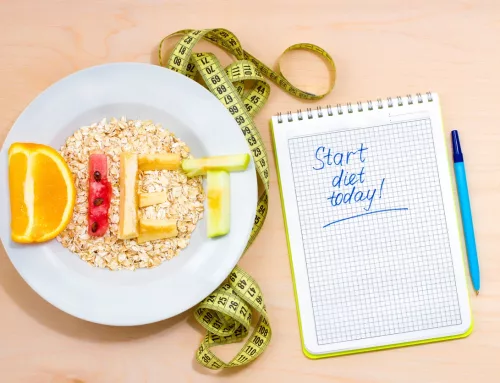Menopause & Weight Gain: What If Your Body Isn’t the Problem?
Navigating menopause weight gain can feel like an uphill battle—especially when every health article says that shrinking your body is the only way to feel better. What if you shifted the focus from a smaller waistline to building body trust and a stronger body to see you through your latter years?
Let’s flip the script on menopause belly fat and dive into intuitive eating for menopause, guided by compassion and science.
Why Does Weight Change in Menopause?
Midlife weight changes are common, and it is the number one reason women reach out to me. Fluctuating estrogen, progesterone, and testosterone slow your metabolism, tweak your appetite, and shift where you carry fat (hello, belly fat!).
But here’s what’s often missed in public health messaging: menopause belly fat isn’t a sign of personal failure, think of it as your body adjusting to new hormonal rhythms. Nourishment, rest, and kindness go a lot further than another strict menopause diet.
Rethinking “Smaller Body = Healthier” in Midlife
Menopause isn’t a mistake you need to fix. It’s a natural life transition, not a flaw to fix! A stage that calls for curiosity, self-compassion, and real talk about diet culture. It can be a time to challenge internalised diet culture, especially the myth that thinness equals health.
Shift your energy from chasing a number on the scale to how you want to feel: fuelled, strong, and energised. This isn’t about giving up; it’s about respecting your body’s journey through hormonal changes.
Before you dive back into calorie counting, these questions can be helpful to consider to gain a greater understanding of why weight change is so important to you:
- What does a smaller body really mean to me—control, safety, approval?
- Has dieting genuinely improved my wellbeing and how I feel about myself, or has it heightened stress and disconnection from my body’s needs?
- Have past attempts to shrink my body brought more wellbeing, or more worry and restriction?
- Am I hoping to feel something through weight loss — less invisible, more in control, more validated?
These questions help you uncover why midlife weight matters so much—beyond the social media mirror
As a gut health specialist and menopause dietitian, I work with women every day who are learning to trust their bodies again — without rigid food rules or unrealistic expectations. Weight change in menopause is common, BUT it doesn’t automatically signal poor health. In fact, trying to force the body into a smaller size can increase your food obsession, raise cortisol levels, and disrupt digestion.
There is no one “menopause body type” to strive for. What matters is creating a nourishing routine that supports energy, hormonal harmony, and digestive comfort — all while honouring emotional wellbeing.
Why Dieting During Menopause Often Backfires
It’s no surprise that menopause is often accompanied by a surge in diet messaging — promising “quick fixes” to lose menopause belly fat or reverse hormonal weight gain. But these approaches rarely support long-term wellbeing. In fact, chronic dieting during this phase can work against your body’s natural rhythm in profound ways.
Disrupted Hormonal Balance
Restrictive eating can elevate stress hormones like cortisol, which not only increases abdominal fat storage but also interferes with your sleep, mood, and blood sugar stability. At the same time, insulin sensitivity may worsen, making the body more prone to cravings, fatigue, and reactive eating patterns. This hormonal rollercoaster amplifies symptoms like hot flushes and night sweats, brain fog, energy crashes and hunger.
And the more we try to control food, the more the body pushes back — a biological survival mechanism that protects against perceived scarcity.
Eroding Body Trust & Nutritional Connection
Dieting can weaken your intuitive relationship with food, leaving you disconnected from vital internal cues:
- Hunger and fullness signals become dulled or ignored
- Eating turns into a math problem — measured, tracked, controlled
- Food choices feel charged with morality, judgment and fear, rather than nourishment and enjoyment
This often leads to the binge–restrict cycle and feelings of failure — despite your body doing its best to protect you.
Impact on Muscle & Bone Health
Midlife is a critical window for maintaining bone density and lean muscle mass, yet aggressive dieting can reduce protein intake, energy availability, and specific nutrients such as calcium and magnesium, harming bone density and muscle mass just when you need them the most.
Why Intuitive Eating Supports Health in Midlife
Instead of waging war on weight gain, intuitive eating invites you to become your body’s ally. It’s not about giving up, it’s about tuning in.
- It encourages you to start eating based on your personal biological cues rather than external rules or restriction
- It emphasises the importance of prioritising your satisfaction and enjoyment of food, your energy levels and mood rather than a number on the scales.
- By moving away from restrictive behaviours intuitive eating can help alleviate emotional eating triggers and support better sleep through reduced food anxiety and improved satiety
Final Thought: Your Worth Was Never Tied to Your Weight
Your value hasn’t changed. Your body isn’t failing you—it’s adapting with strength and wisdom.
Release the pressure to “get back” to an old size. Instead, approach this menopause chapter with self-kindness, trust, and respect for your body’s natural evolution.






